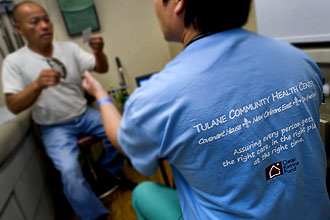Better Urban Health Is on the Agenda
The United States spends more on health care than any other developed country, yet its health outcomes are in the bottom third of developed countries. The Tulane School of Medicine hosted a summit recently to spur conversation about how medical schools in urban settings can partner with their communities to improve the health of chronically underserved populations in American cities.

Tulane community health clinics and mobile medical units, an initiative that began after Hurricane Katrina, allow the School of Medicine to reach out to patients throughout the New Orleans area. (Photo by Paula Burch-Celentano)
At the Summit on Urban Health, a university consortium, Tulane showcased the innovative programs it has implemented since Hurricane Katrina, says Leah Berger, executive director of the Tulane Office of Community Affairs and Health Policy and co-executive director of the Tulane Community Health Centers.
“We're happy Tulane has been invited to be part of the consortium from the very beginning and proud of what we have accomplished since last year's meeting,” Berger says, “but we have a lot of work yet to accomplish.”
The Summit on Urban Health, held on Jan. 20â“21, provided an opportunity for peer-to-peer learning about best practices and how medical schools in urban settings can engage community members, Berger says.
“In Louisiana, we have an office of rural health but not an office of urban health,” Berger observes. “Since we're in an urban environment, we as a university and school of medicine have the responsibility to improve the health of people in our own backyard.”
The summit drew participants from urban medical schools in Oklahoma, Illinois, Florida, California, New Jersey and Michigan, as well as representatives from the Association of American Medical Colleges and the Implementation Group/Coalition of Urban-Serving Universities.
“We're like-minded institutions that are moving forward for the betterment of our communities,” Berger says. “By joining with other institutions, we can impact health care in our urban communities and shape the workforce of future physicians. We also want to become more engaged in health care reform we want to be at the table.”
